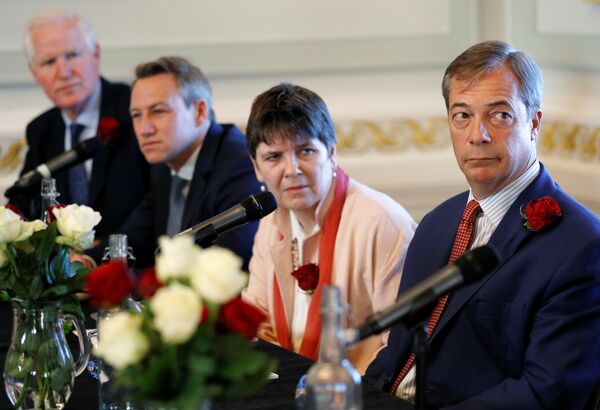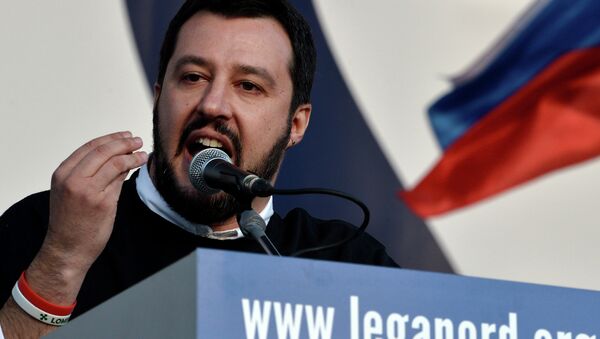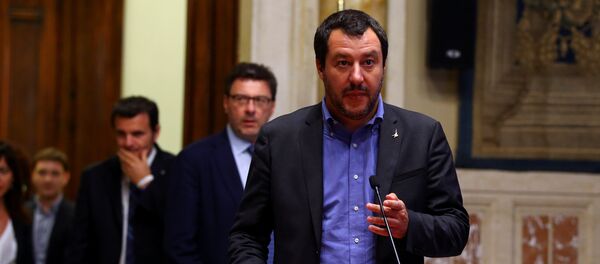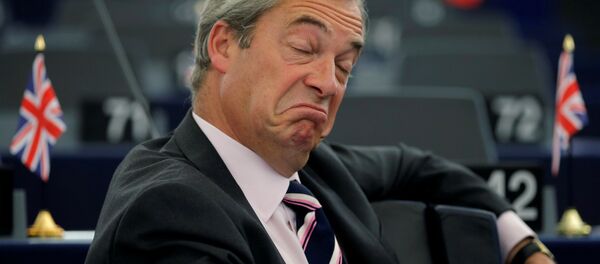The European Parliament (EP) elections scheduled for 23-26 May have become the focus of worldwide attention due to the tense political struggle between the establishment parties and the emerging right-wing coalition over Brussels' migration and economic policies. According to the latest Politico Poll of Polls, The European Parliament's two largest blocs — the European People's Party (EPP) and the Socialists and Democrats group (S&D) are likely to lose a combined 98 seats, gaining 170 and 144 mandates, respectively. The two parties are ceding positions to the liberal Alliance of Liberals and Democrats for Europe (ALDE) as well as to the Europe of Nations and Freedom (ENF), a right-wing bloc. The latter may transform after the vote into a European Alliance of People and Nations (EAPN), led by Italy's Deputy Prime Minister Matteo Salvini.
Sputnik: Italy's Deputy Prime Minister Matteo Salvini is going to host an 18 May rally in Milan with fellow European right-wing leaders to drum up support ahead of the European Parliament vote. The event is expected to bring together at least 11 EU right-wing parties. Previously, Salvini signalled his support to Marine Le Pen's National Rally, the Alternative for Germany and Viktor Orban's Fidesz. What do you think about Salvini's role in shaping the right-wing coalition? Why did he become the leader of the movement? Does he have enough political instruments to maintain leadership among the European Right? What potential obstacles could he face?
Glenn Diesen: Taking the populist movement from the fringe to centre of the EU has catapulted Salvini into leadership for the main right-wing coalition in the EU parliament elections. Salvini is emerging as the EU's worst fear, a formidable leader that brings together right-wing conservative movements across Europe to reverse the centralisation of political power. The populists are very diverse in terms of their political beliefs and policies, yet Salvini has strong credentials for uniting diverse political groups.
READ MORE: While EU Lashing Out at Orban, Hungary Finds Allies in Italy, US
Sputnik: The latest polling for the European Parliament elections has indicated that Nigel Farage's Brexit Party is likely to gain the most seats in the UK, which means a resounding defeat of Theresa May's Conservative Party. Will Farage's party join the emerging right-wing coalition within the European Parliament? How will Farage's potential win affect PM May's positions in the UK?
Glenn Diesen: Farage is confronted with a dilemma concerning the relationship between the Brexit Party and the emerging right-wing coalition. On one hand, Farage would like to support a strong conservative coalition capable of disrupting the EU. After the Brexit referendum, Farage expressed ambitions beyond Brexit, as he declared his intention to support other populist movements across Europe. On the other hand, as Farage has returned to British politics with the Brexit Party, he must balance this with other priorities.
READ MORE: Theresa May in TEARS Amid Resignation News, Boris Johnson Ready to Join The Fray

The pressure has subsequently mounted on Theresa May. Failure to deliver on a full withdrawal from the Customs Union and the Single Market would result in the Brexit issue seeping into domestic politics, as the Brexit Party would also disrupt the general election. Theresa May is already accused of betraying the referendum, and now she could be held responsible for destroying her own political party. The European Parliament elections can be interpreted as a second referendum on Brexit, and a strong win for Farage would mount greater pressure on PM May to fall in line with the Brexiteers.
READ MORE: UK Conservative Party Rating Hits Nearly 20-Year Lowest — Poll
Sputnik: The latest Politico Poll of Polls analysis has indicated that the centre-Right European Peoples' Party (EPP) and centre-Left Socialists & Democrats (S&D) are likely to lose seats amid the emergence of the right-wing parties, although EPP and S&D will remain the largest parliamentary group. What do you think about the recent trend and how will it shape the European Parliament's policies after the elections?
Glenn Diesen: If the populists take a third of the seats in the European Parliament, it will be considered a vindication for people like Viktor Orban, who has come under great pressure from Brussels and Berlin to fall in line. Success at the ballot box will therefore embolden populist leaders and pressure the EU to develop an attractive vision for the future. It could also result in political leaders being more prepared to challenge former red lines to win over the electorate. A prime example is Macron's recent questioning of the Schengen agreement to curb the free movement of people, which demonstrates that political elites must yield to populist pressures if they want to remain in power.
Glenn Diesen is a professor at the Higher School of Economics (Moscow), and author of "The Decay of Western Civilisation and Resurgence of Russia: Between Gemeinschaft and Gesellschaft," (2018) and "Russia's Geoeconomic Strategy for a Greater Eurasia (Rethinking Asia and International Relations)" (2017).
The views and opinions expressed by the speaker do not necessarily reflect those of Sputnik.





